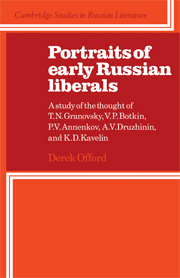 Portraits of Early Russian Liberals
Portraits of Early Russian Liberals Published online by Cambridge University Press: 06 July 2010
Kavelin's life, character and work
Konstantin Dmitriyevich Kavelin was born in 1818 into a family which owned landed property and serfs in the province of Ryazan. His father was Russian but his mother was Scottish, the orphaned daughter of one John Baillie, who had worked as an architect at the court of the Emperor Paul. His early education was haphazard, like Granovsky's: he was taught at home by a succession of more or less inadequate tutors, among them the young Belinsky, who for a short time in 1835 was employed to prepare Kavelin for examinations in Russian literature. (The critic was a source of inspiration to his impressionable adolescent pupil, but hardly competent as a teacher.) From 1835 to 1839 Kavelin studied in the law faculty of Moscow University and for a further three years remained in the city, living with his parents and continuing his studies privately. Here he began to mix with prominent members of the Westernist intelligentsia, such as Granovsky (who had a great influence on him) and the university professors, Redkin and Kryukov. He also met Chaadayev. At the same time he frequented Yelagina's salon, at which he came into contact with leading Slavophiles. In 1842 he moved to St Petersburg in order to serve in the Ministry of Justice. Here in the northern capital he resumed his acquaintance with Belinsky and grew close to Botkin, Turgenev, Nekrasov, Panayev and other prominent men of letters.
To save this book to your Kindle, first ensure [email protected] is added to your Approved Personal Document E-mail List under your Personal Document Settings on the Manage Your Content and Devices page of your Amazon account. Then enter the ‘name’ part of your Kindle email address below. Find out more about saving to your Kindle.
Note you can select to save to either the @free.kindle.com or @kindle.com variations. ‘@free.kindle.com’ emails are free but can only be saved to your device when it is connected to wi-fi. ‘@kindle.com’ emails can be delivered even when you are not connected to wi-fi, but note that service fees apply.
Find out more about the Kindle Personal Document Service.
To save content items to your account, please confirm that you agree to abide by our usage policies. If this is the first time you use this feature, you will be asked to authorise Cambridge Core to connect with your account. Find out more about saving content to Dropbox.
To save content items to your account, please confirm that you agree to abide by our usage policies. If this is the first time you use this feature, you will be asked to authorise Cambridge Core to connect with your account. Find out more about saving content to Google Drive.